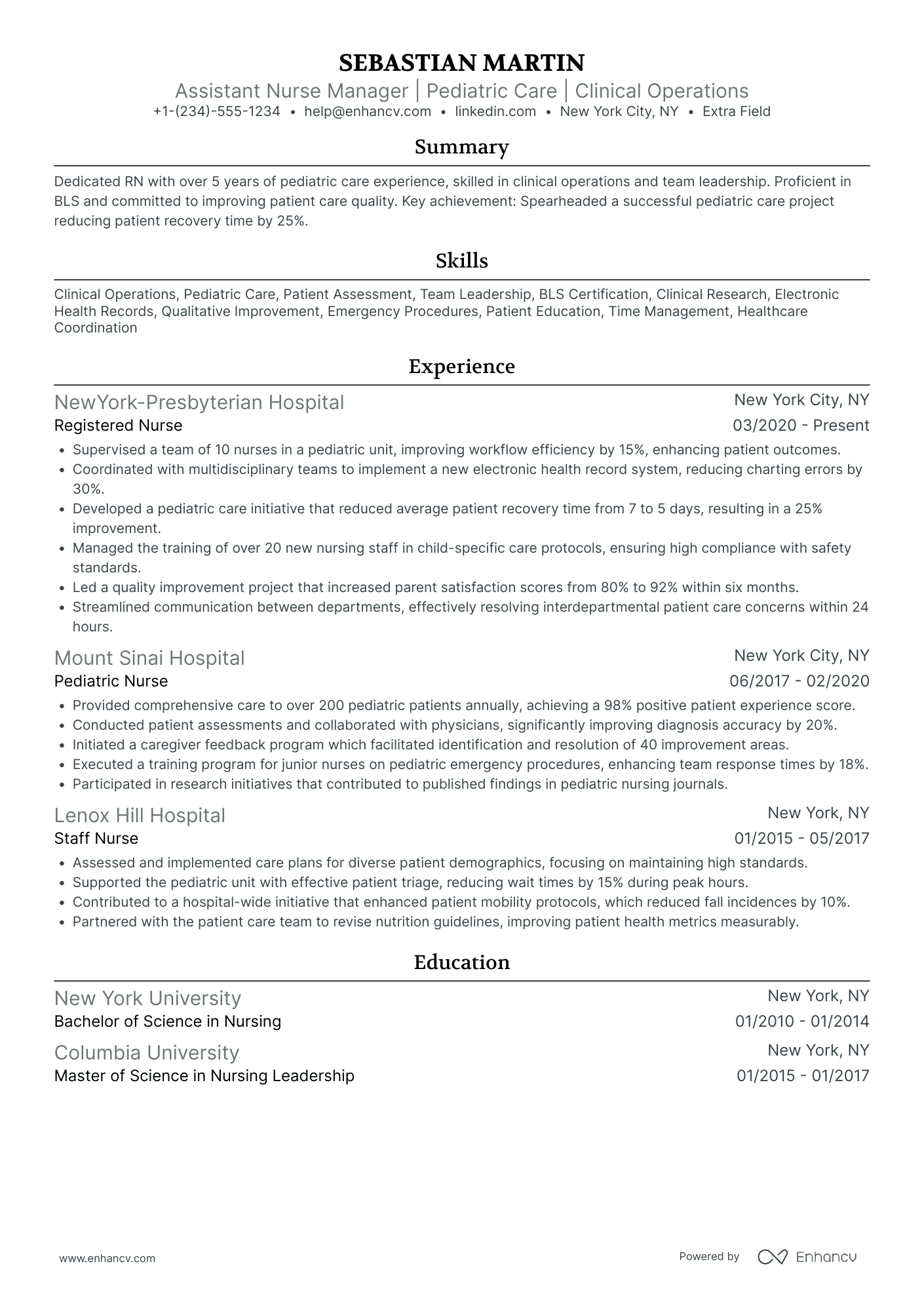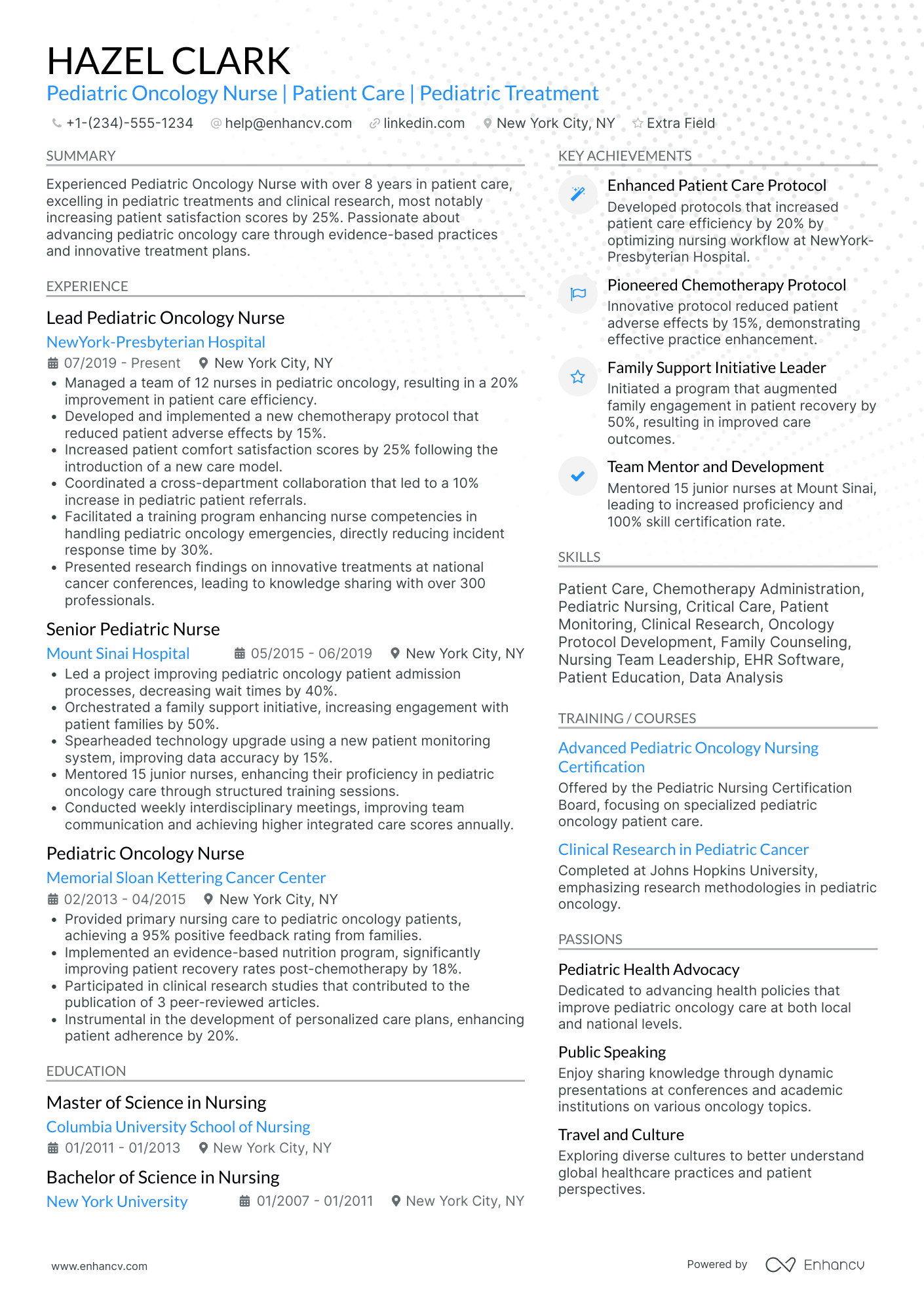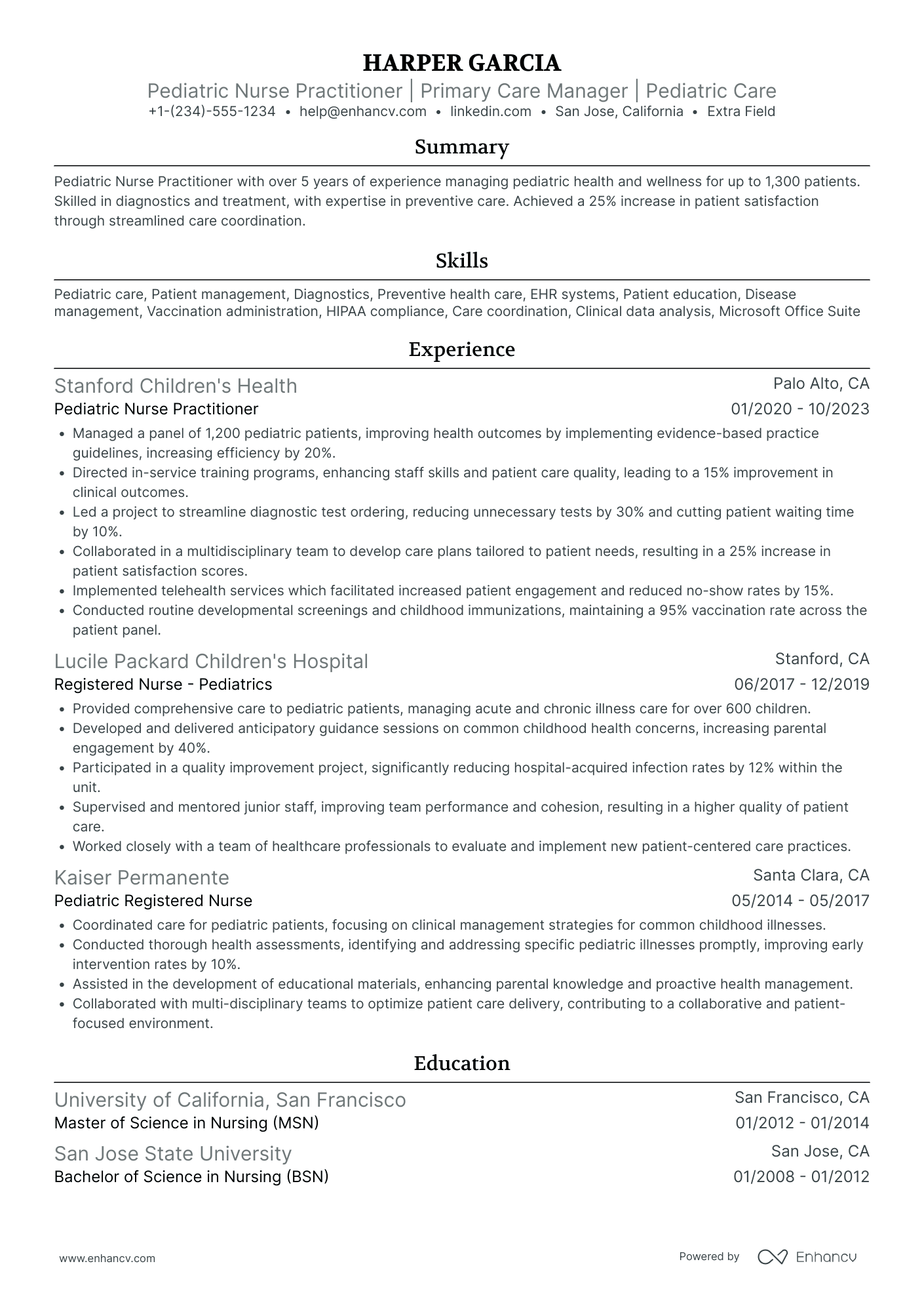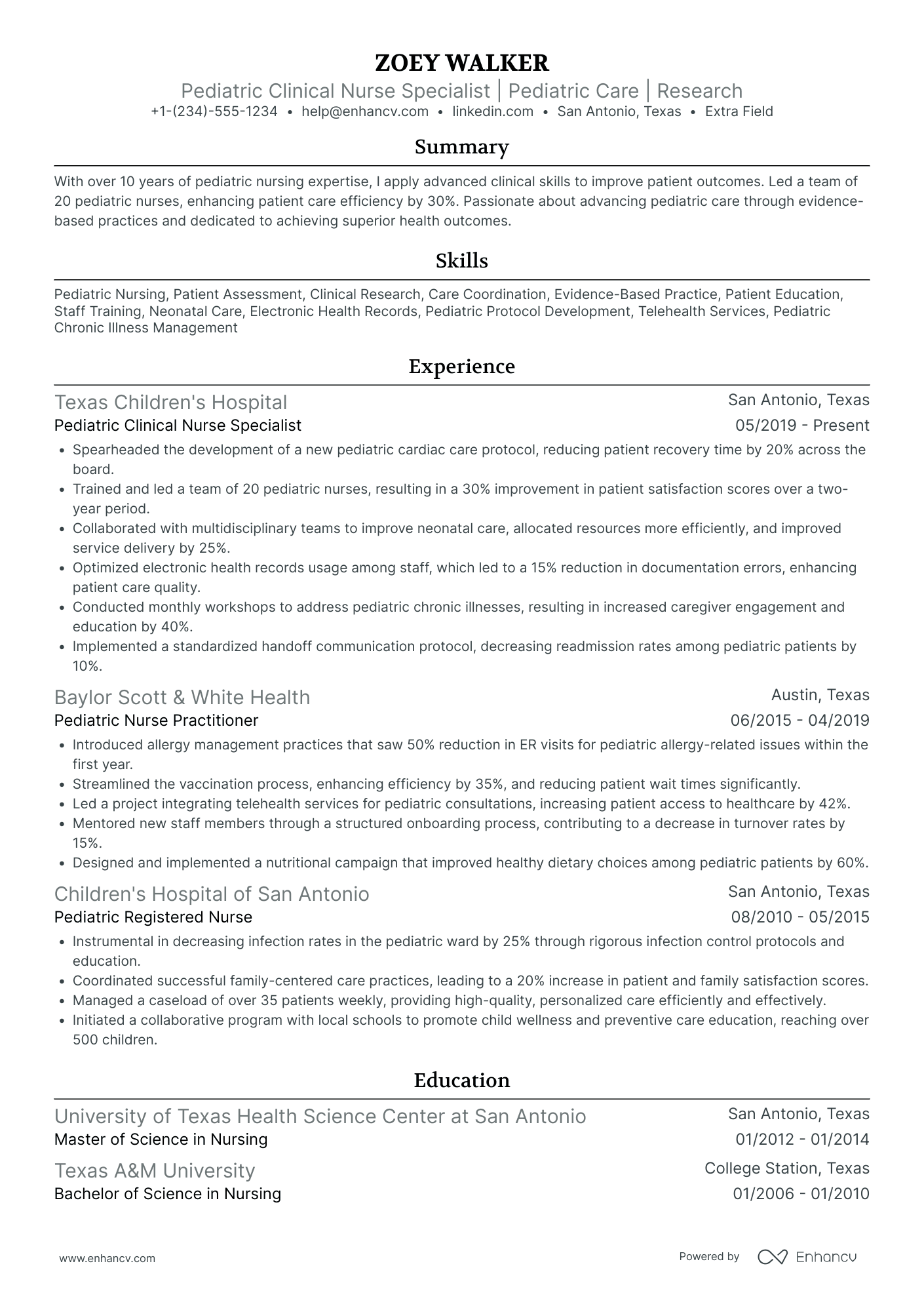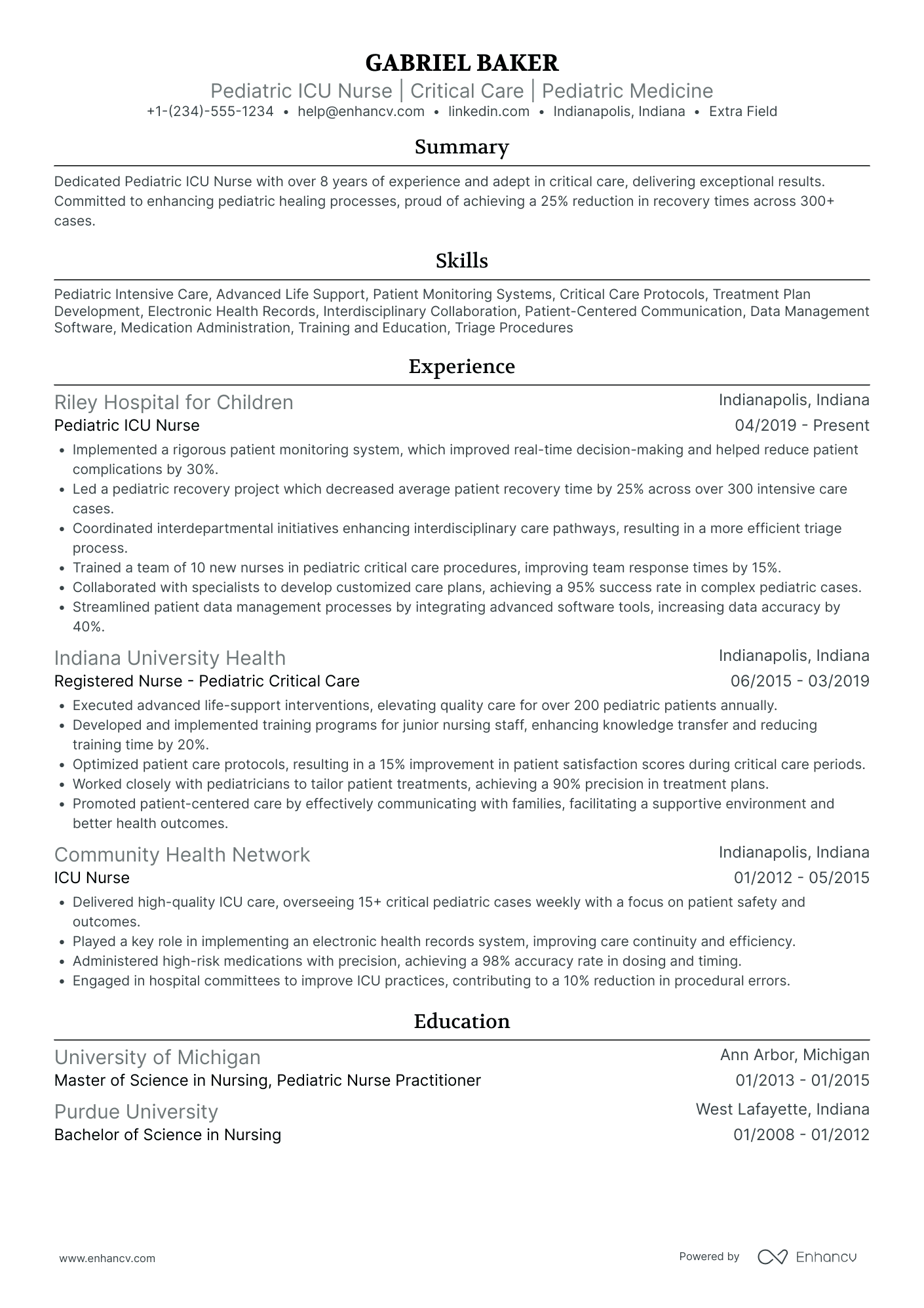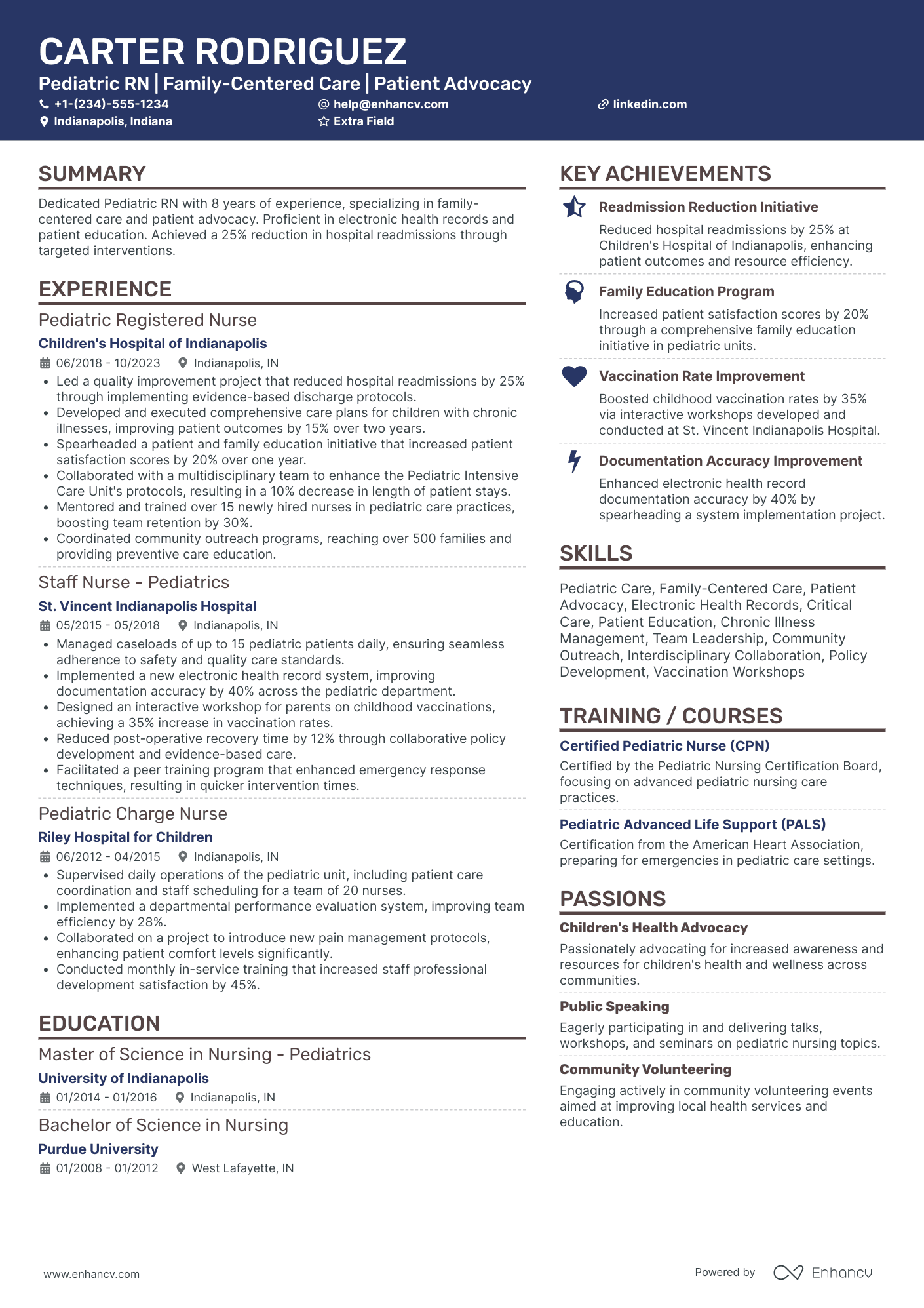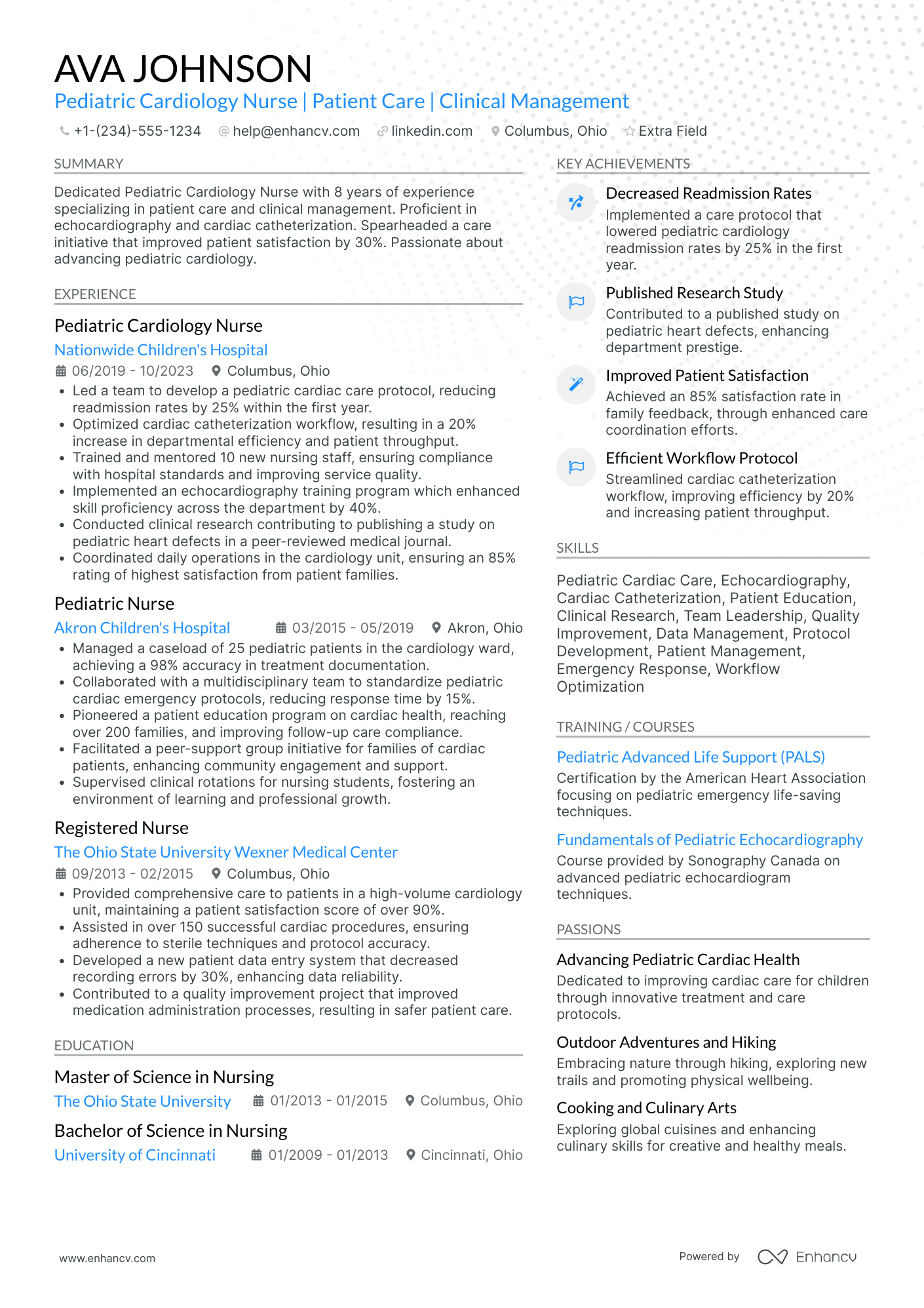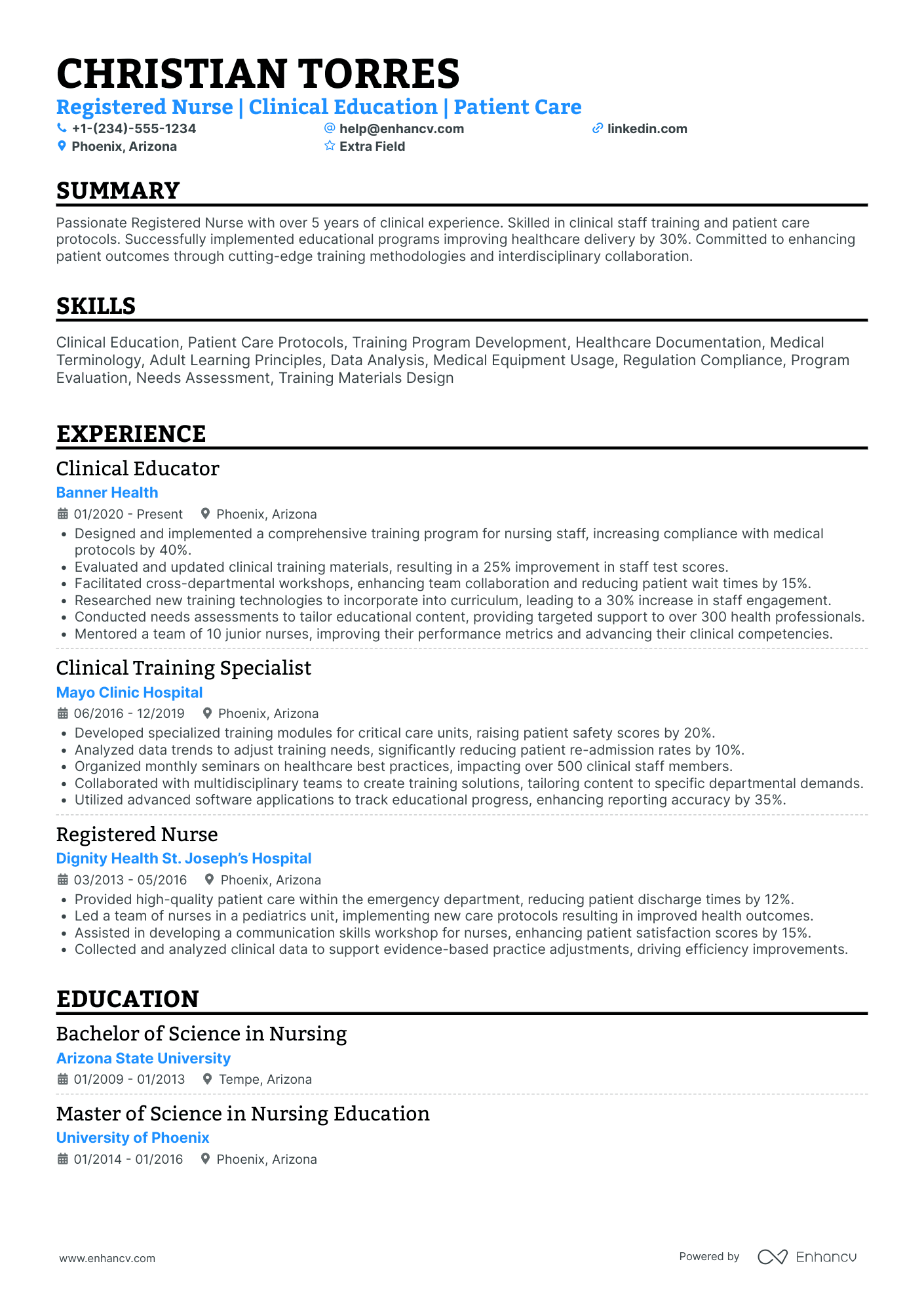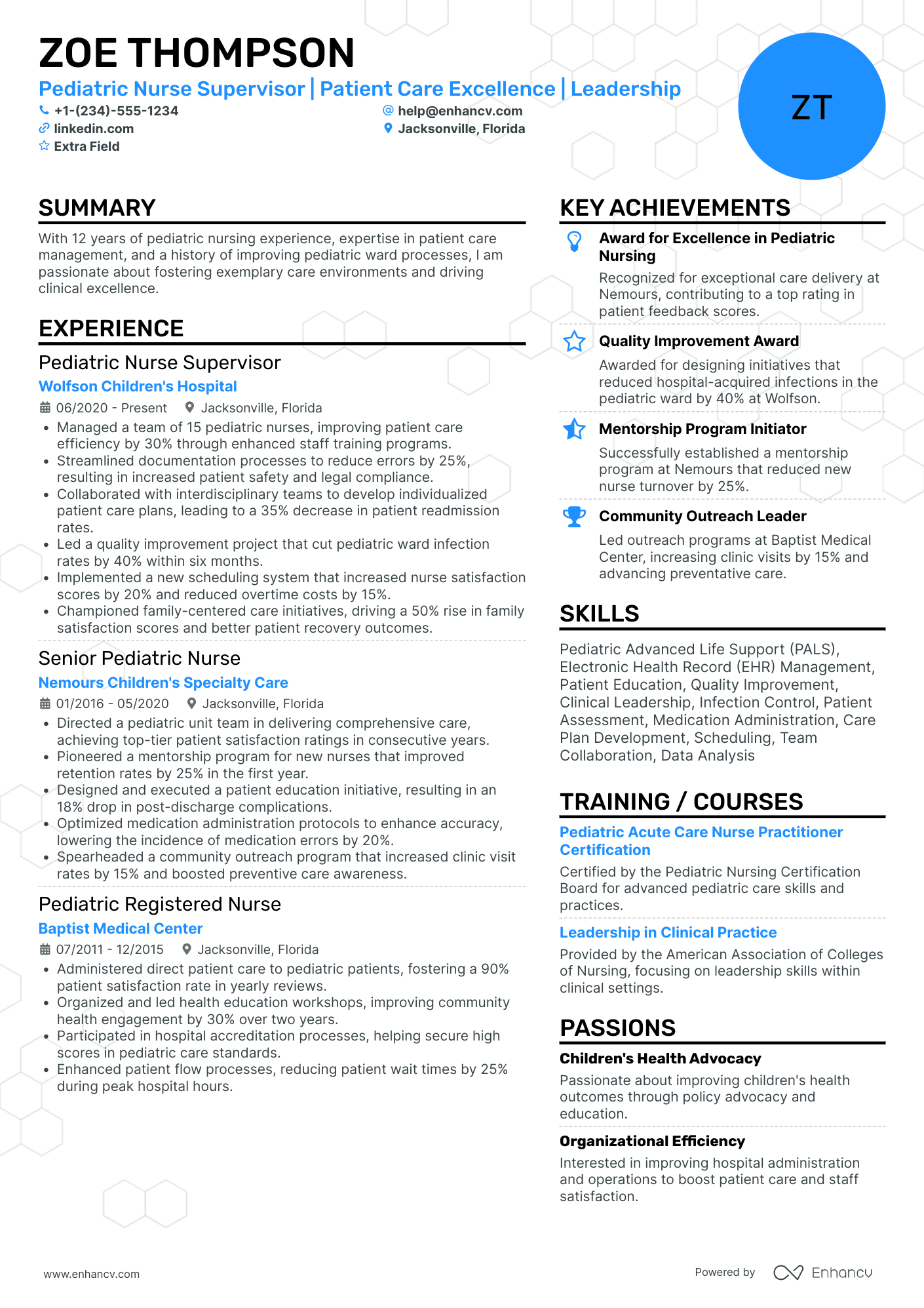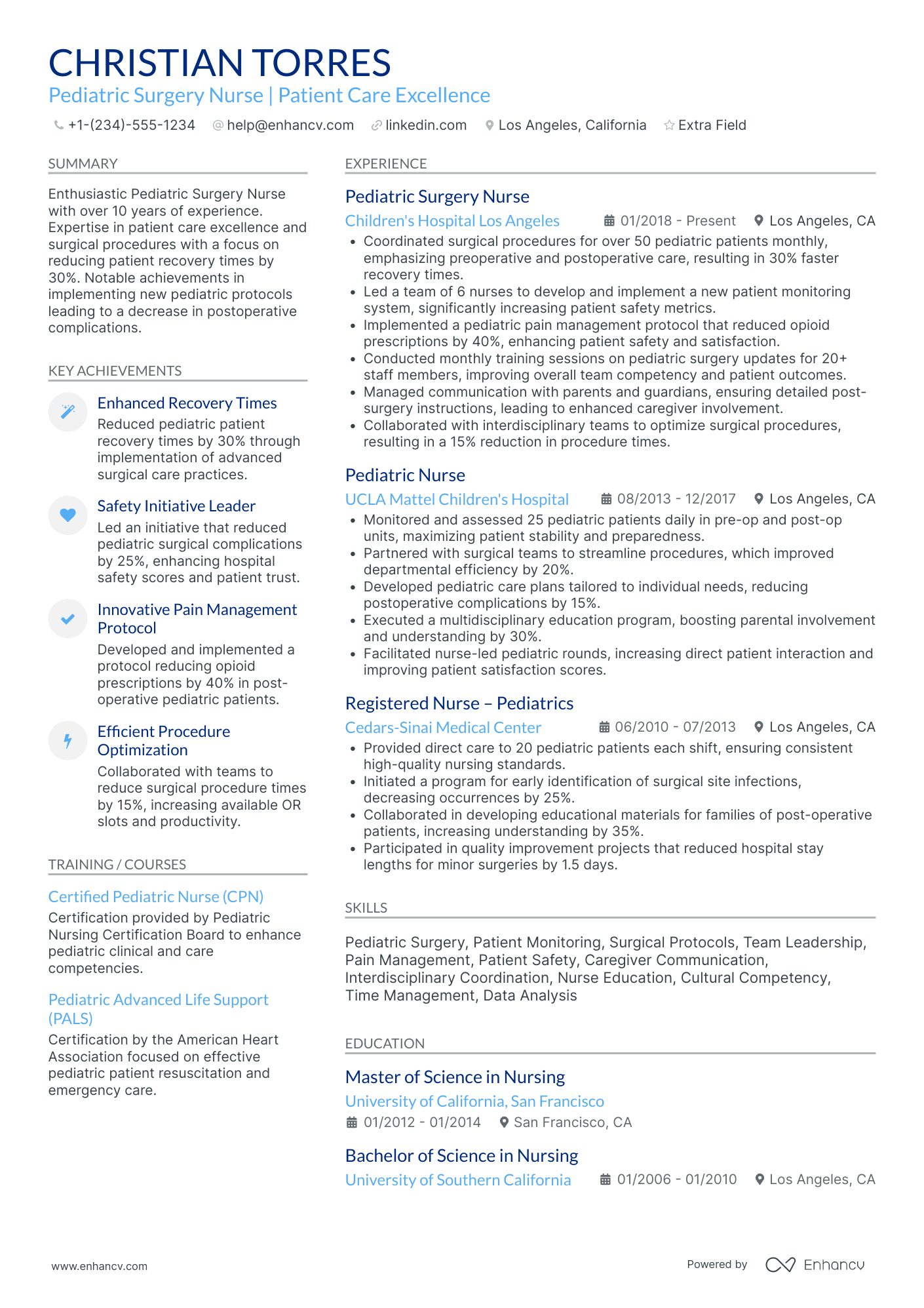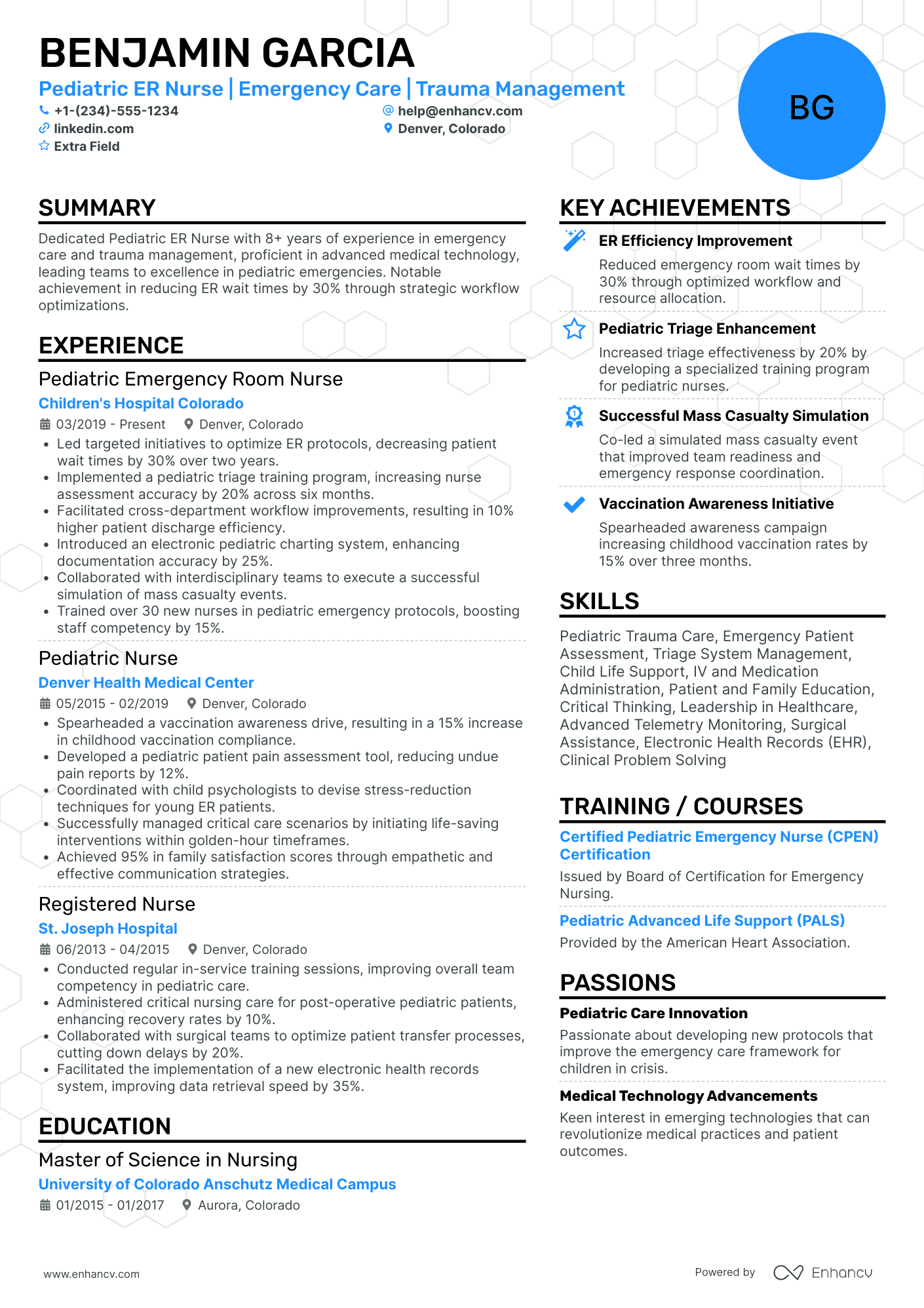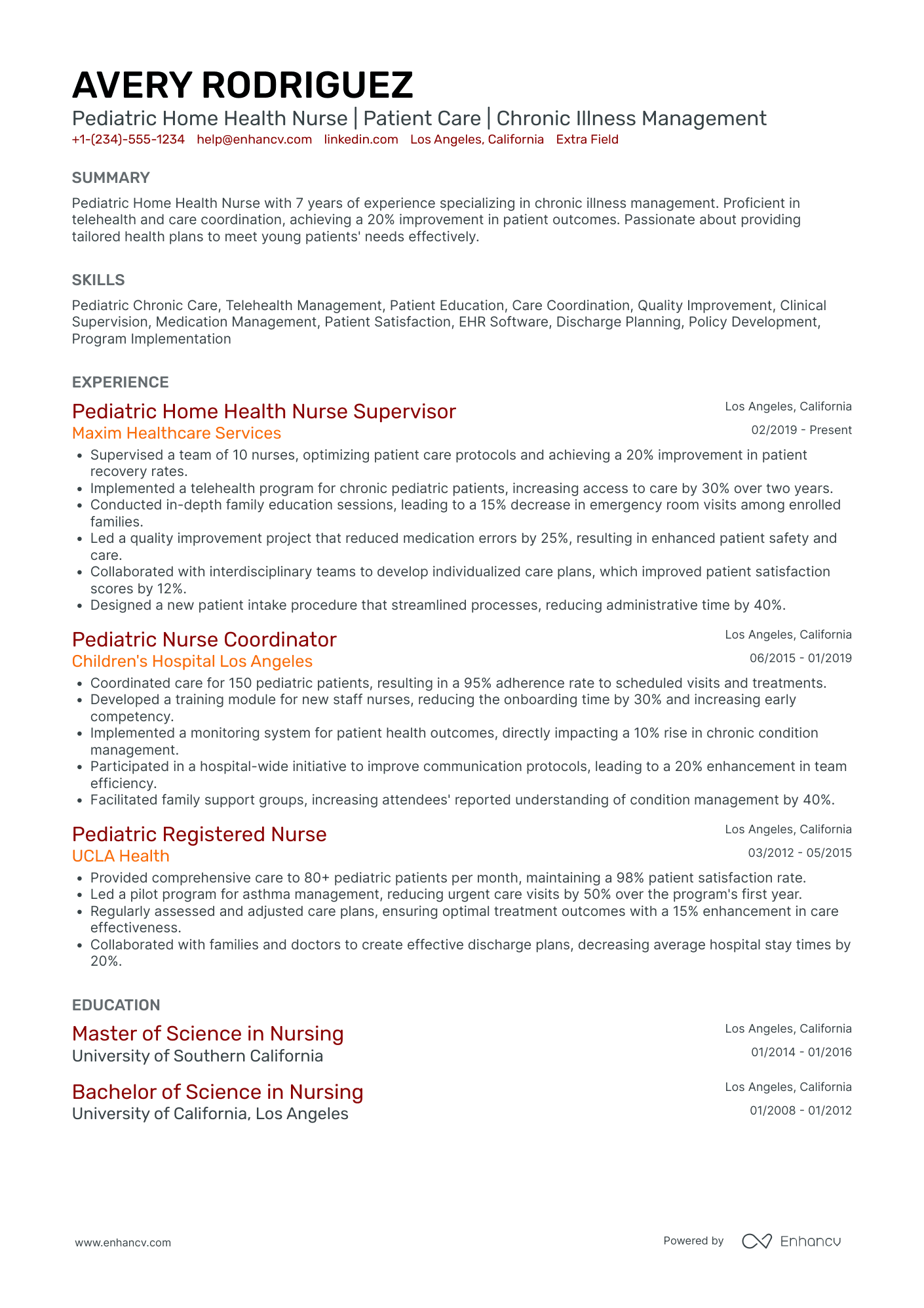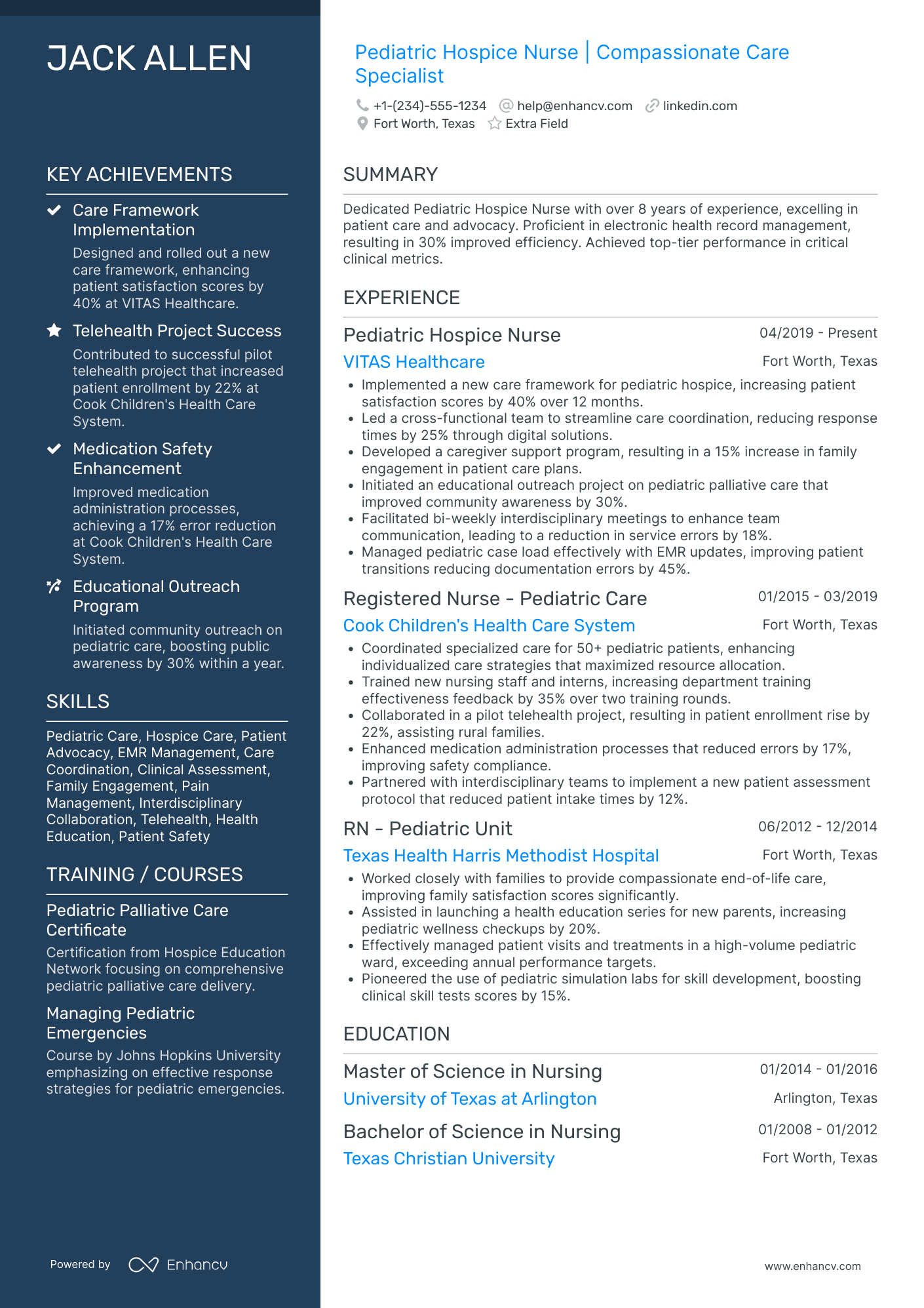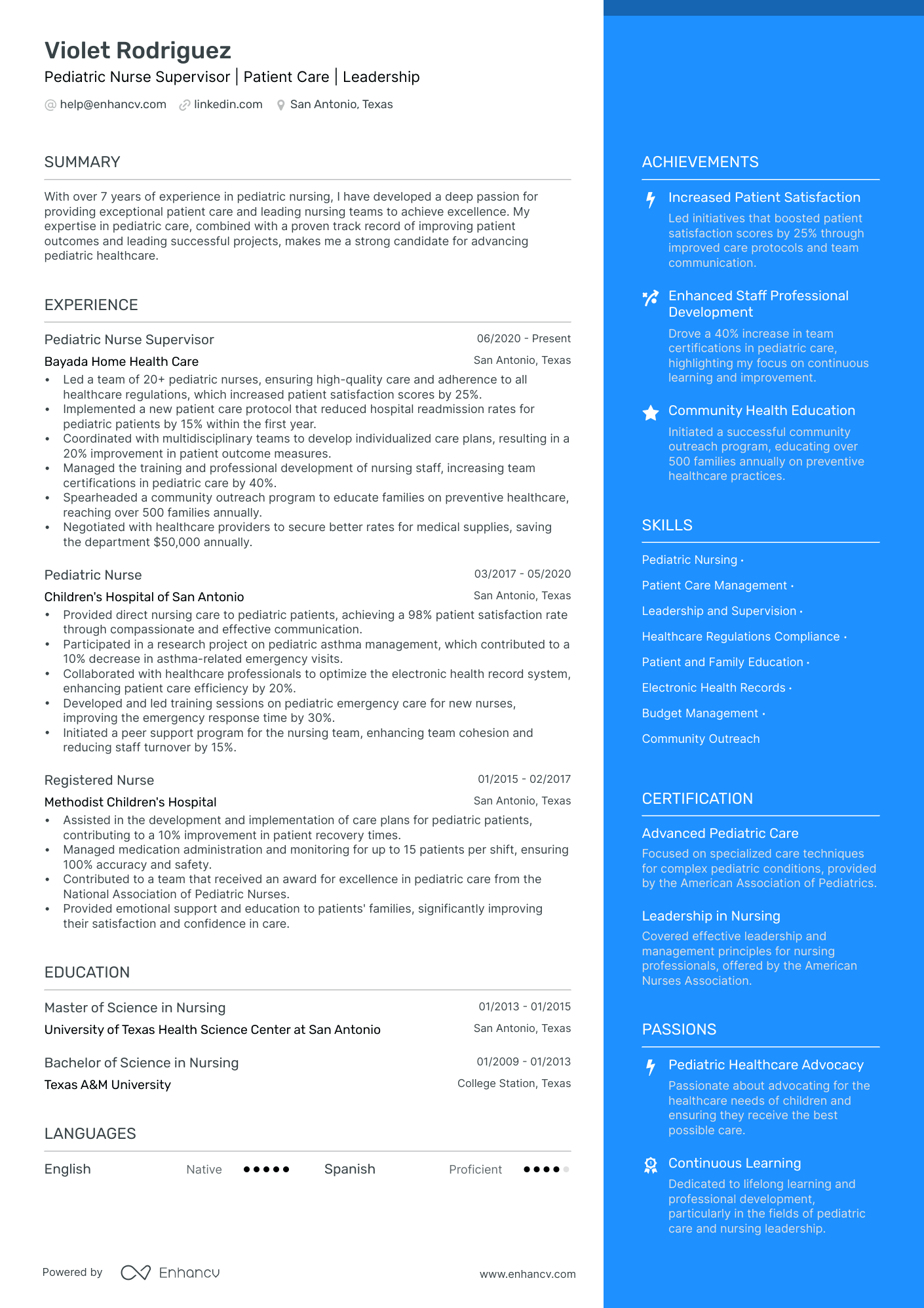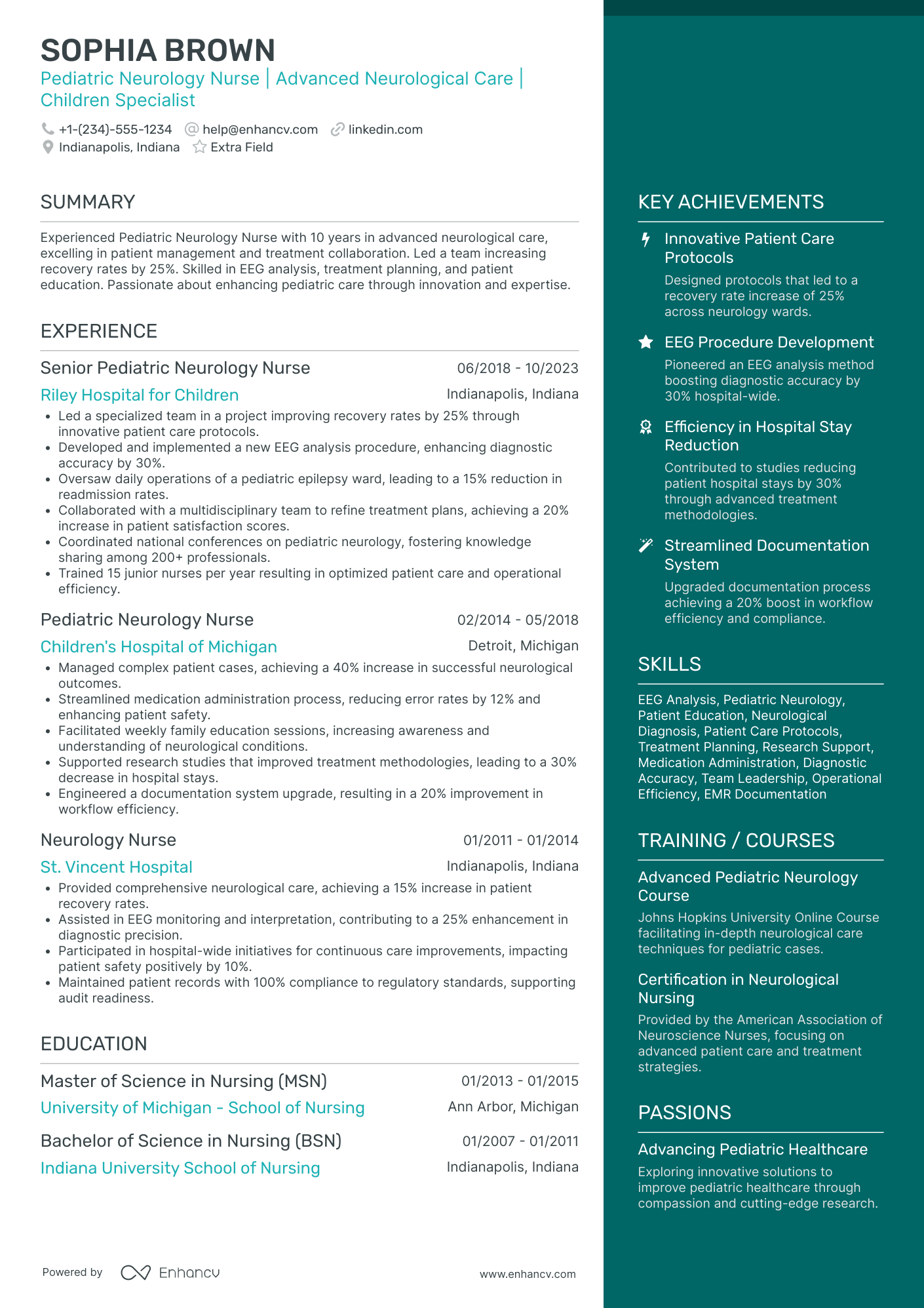As of 2022, the World Health Organization reports that the global nursing and midwifery workforce totals 27 million, nearly half of all health workers. Yet, the nursing field faces ongoing shortages due to challenges like unequal distribution across regions, high job turnover, and a deficit of educators for nursing students (Haddad et al., 2025).
These challenges are mirrored in the specialized field of pediatric nursing, where professionals tackle unique difficulties such as addressing parents' concerns and mastering effective communication. Yet the satisfaction from seeing a child's recovery is deeply rewarding. Recognizing this, our website provides resume templates for those aspiring to enter this field, helping to highlight their skills and commitment to pediatric care effectively.
Unsure about the best way to present this? Find out about this and further details in our guide:
- The key elements to highlight in your pediatric nurse resume
- Crafting a compelling professional summary that resonates with pediatric nursing values
- Experience and achievements that demonstrate your expertise in pediatric nursing
- Techniques to make your resume appealing to healthcare recruiters
- Essential pediatric nursing skills to feature on your resume
Seeking alternatives to a pediatric nurse? Explore Enhancv's resume guides for related healthcare positions.
Adapt these tips for a pediatric nurse resume. Highlight key strategies from pediatric nursing, focusing on specialized skills, patient outcomes, and leadership in child care.
Pediatric nurse resume example
Here’s what this applicant does well in their resume:
- Demonstrates Impact on Patient Outcomes: The resume effectively showcases specific achievements, such as improving patient recovery times by 30%, decreasing hospital readmission rates, and enhancing patient satisfaction. These quantifiable outcomes highlight the candidate’s direct impact on healthcare quality and efficiency.
- Highlights Specialized Skills and Certifications: The inclusion of specialized certifications in advanced pediatric care and pediatric emergency care, along with skills like pain management and medication administration, positions the applicant as highly qualified and specialized in pediatric nursing.
- Details Leadership and Initiative: Through examples like leading projects to integrate technology in patient education and developing new patient care protocols, the resume demonstrates strong leadership skills and initiative, showcasing the candidate's ability to drive improvements in healthcare settings.
Your resume's format must effectively showcase your pediatric nursing skills. Learn how to optimize it correctly.
How to format a pediatric nurse resume
To make your PN resume stand out, it's important to select the appropriate format. Here are three effective resume formats tailored for pediatric nursing:
- Reverse chronological resume: Ideal for pediatric nurses with substantial experience, this format lists your latest job first and progresses backward, showcasing a steady career progression in nursing.
- Functional resume: This format is great for those new to pediatric nursing, transitioning from other nursing areas, or with gaps in employment. It emphasizes your skills and qualifications in pediatric care rather than your employment history.
- Combination resume: This format blends the chronological and functional styles, allowing you to feature key skills and accomplishments upfront, followed by a brief listing of your work history. It's excellent for highlighting relevant experiences that align with the specific pediatric nursing position you seek.
Looking to create a pediatric nurse resume that catches the eye of recruiters? Follow these smart tips:
- For a polished pediatric nurse resume, consider a double-column template to make it visually engaging and easy to navigate.
- Choose simple fonts like Rubik, Calibri, or Volkhov in sizes 10 to 12 for a clean and professional appearance.
- Set your margins to at least 1 inch and use subtle accent colors such as gray or blue to enhance readability.
- Include your name, phone number, location, and professional email address in the header of your resume.
- If relevant, add a link to your updated LinkedIn profile. Only include a photo if specifically requested by the job advertisement.
- Save your resume as a PDF to preserve its layout across different devices and platforms.
To be effective, it's crucial to make your resume friendly to Applicant Tracking Systems. An ATS is a software that employers use to filter resumes by scanning for specific keywords related to skills, education, experience, etc.
For pediatric nurses, optimizing your resume means using ATS-compatible formats and fonts like Rubik, Lato, and Raleway, while avoiding tables, columns, and images. Enhancv offers ATS-compliant resume templates for pediatric nurses, simplifying the process of including all essential details and focusing on what matters most.
Your resume should match the market – Canadian applications, for instance, may use a different layout.
If your pediatric nurse resume needs updating, consider our free, quick AI resume checker. It performs 16 essential reviews to ensure your resume is ready for success, aiming to boost your chances for interviews.
Is your resume good enough?
Drop your resume here or choose a file. PDF & DOCX only. Max 2MB file size.
Follow specific formatting guidelines to spotlight your resume's key sections effectively.
Curious about these sections?
Let's review and identify them!
The top sections on a pediatric nurse resume:
- Pediatric Nursing Skills: To show your proficiency in areas that directly relate to pediatric nursing, like patient care, emergency response, and medical terminology.
- Certifications: To display additional credentials that have equipped you to be a competent pediatric nurse such as pediatric advanced life support (PALS) or certified pediatric nurse (CPN).
- Professional Experience: To provide your work history and demonstrate that you have practical experience as a pediatric nurse, showcasing your responsibilities and achievements in past roles.
- Education: To point out your academic qualifications including your nursing degree, which is a requirement for the position.
- References: To offer potential contacts who can vouch for your abilities and character as a pediatric nurse, instilling confidence in your prospective employer.
If your pediatric nurse resume feels too detailed due to vast experience, aim for a concise 2-page format as the norm for seasoned professionals. Cut down by keeping only the most important skills and experiences that match what recruiters in the healthcare industry look for in a pediatric nurse.
Let's look closer.
What recruiters want to see on your resume:
- Specific Pediatric Experience: Recruiters prioritize nurses with pediatric experience because of the unique needs and challenges involved in providing healthcare to children.
- Certifications: Particular attention is given to courses like Pediatric Advanced Life Support (PALS) or certifications like Certified pediatric nurse (CPN), as they validate the nurse's qualifications in pediatric care.
- Continuing Education: Recruiters prioritize nurses who are committed to ongoing learning, as updated knowledge of new procedures and treatments is critical to delivering the best patient care.
- Communication Skills: Effective communication is key in pediatric nursing because the nurse must be able to explain complex medical terms and procedures to children and their parents in a simple, understandable manner.
- Emotional Intelligence: The ability to empathize with and comfort children in distress is highly sought after in pediatric nursing which can be a determining factor for recruiters.
To get a good impression from recruiters, make your pediatric nursing resume's work section clear and to the point, but also full of important details. This part is what employers really look at to see if you're right for the job.
We'll guide you on what works best and what doesn't.
How to write your pediatric nurse resume experience
In pediatric nursing, the goal is to enhance the quality of care for children. This includes focusing on key health indicators like improved recovery rates, reduced hospital admissions, and higher satisfaction among young patients and their families. Emphasize the actual effects you've achieved in previous pediatric nursing positions, with specific examples of improvements and results.
We'll begin by identifying practices to avoid, drawing from our experience with both successful and less successful methods.
- •Implemented nursing strategies to improve child patient care
- •Monitored key pediatric health metrics for quality outcomes
- •Collaborated with healthcare teams, families, and pediatric healthcare partners
- •Conducted regular patient monitoring and maintained thorough documentation
Rather than listing past duties, your pediatric nurse resume should illustrate how your actions enhanced patient care and outcomes. The first experience section needs improvement as it:
- Fails to demonstrate how a nurse's actions specifically improved patient outcomes.
- Omits detailing the benefits of nurse's activities on patient care and healthcare growth.
- Excludes presenting quantifiable successes to showcase the nurse's impact and efficiency.
- •Used proven care methods, helping kids recover 20% faster and reducing return visits by 30% in a year.
- •Improved how happy patients are by 25% in six months.
- •Worked together with doctors, families, and others, making patient care better and increasing successful treatments by 40%.
- •Made checking on patients and keeping records faster by 35% and cut down time for paperwork by half.
The second example is better because it:
- Clearly demonstrates the nurse's impact, making achievements understandable.
- Emphasizes innovation and teamwork as healthcare strengths.
- Quantifies actions' effects on patient care and efficiency.
Highlighting real work experience on your resume significantly impacts your job application, especially for pediatric nurses.
Now let's explore this further.
How to quantify impact on your resume
While numbers on a pediatric nurse resume are important, not every achievement can be quantified. Nonetheless, to captivate healthcare executives, focus your resume on specific outcomes and contributions you've made in pediatric care. Emphasize also both measurable results and impactful experiences that demonstrate your value and expertise in the field.
- Include the number of patients cared for on a daily or weekly basis
- Mention the age range of patients treated
- Record the number of procedures routinely performed
- Document the number of training sessions or workshops attended annually
- Detail any error rate reduction or efficiency improvement you contributed to
- Mention any reduction in patient complaints or increase in patient satisfaction scores under your care
For pediatric nurse resumes, it's essential to display both measurable impacts and a combination of hard and soft skills, emphasizing your well-rounded abilities in patient care.
How to list your hard skills and soft skills on your resume
Moving to the skills section of your resume, it’s important to detail your nursing training, areas of specialization, and practical experience in pediatric care. This professional knowledge underlines your readiness for a role in pediatric nursing.
Let's focus on your hard skills.
Hard skills
Highlighting your hard skills is crucial because they demonstrate your expertise in specific nursing practices and medical techniques, which are essential for any pediatric nursing role. Begin by establishing a clear "Hard skills" section on your resume, ideally placed right after your work experience details. This section should list and prioritize your technical abilities, such as patient care, medication administration, and emergency response skills.
If you have a broad range of technical skills, consider organizing them into categories like "Patient care techniques," "Medication management," "Emergency procedures", etc.
Keep reading to discover the essential skills needed for pediatric nurses to thrive in their roles.
Best hard skills for your critical care nurse resume
- Pediatric advanced life support (PALS)
- Intravenous therapy (IV)
- Basic Life Support (BLS)
- Administration of Vaccinations
- Pediatric Assessment
- Wound Dressing
- Electronic Medical Records (EMR) Software
- Newborn Resuscitation
- Medical Procedure Assisting
- Medication Administration
- Ventilator Care
- Using Diagnostic Equipment
- Chronic Disease Management
- Knowledge of Pediatric Diseases
Ensure your pediatric nursing resume also includes soft skills, showcasing your interpersonal abilities alongside your technical expertise.
Soft skills
People skills are essential for your pediatric nursing resume as they underscore your capacity to collaborate effectively and adapt to the dynamic healthcare environment. Rather than segregating these skills into a single section, weave them throughout your resume.
In your summary, include specific examples where you’ve demonstrated these skills. Emphasize relevant soft skills within your work experience and education sections, showing how you’ve effectively utilized teamwork and leadership in medical settings.
Align these skills with the specific demands of the job description and integrate them with your clinical skills to create a targeted resume that portrays a comprehensive and balanced professional identity.
Best soft skills for your critical care nurse resume
- Ability to Comfort Children
- Empathy
- Stress management
- Effective communication
- Patience
- Adaptability
- Multitasking
- Problem-solving
- Active listening
- Teamwork
- Emotional resilience
- Time management
- Strong work ethic
- Compassion
- Decision-making
How to list your education and certifications on your resume
Pediatric nursing is a dynamic field, consistently shaped by advancements in medical practices, emerging technologies, and evolving standards of care. On your resume, emphasizing your education and certifications is key to demonstrating your solid foundation in pediatric care and your dedication to staying current with industry changes.
In the education section of your resume, be sure to spotlight training and coursework that directly relate to pediatric nursing, such as patient care techniques, pharmacology, pediatric health assessments, etc. These details will prove your specialized knowledge and commitment to the field of pediatric nursing.
Here’s how to organize the education section on your resume for a pediatric nursing position:
- Degree title: List the degree you earned, directly related to nursing.
- School name: Provide the name of the educational institution you attended.
- Graduation year: Indicate the year you graduated or expect to graduate.
- Major: Underscore your field of study, such as nursing or healthcare, emphasizing specializations in pediatric care.
- Relevant certifications: Include any pediatric-specific certifications you hold, like CPN or PALS.
- Additional training: Mention any supplementary courses or workshops you completed that enhance your pediatric nursing skills, such as neonatal care or child psychology.
- GPA: If your Grade Point Average is above 3.5, consider adding it to showcase your academic prowess.
These details will help underline your qualifications and readiness for a pediatric nursing role.
- •Specialized Coursework: Advanced clinical practices in pediatric nursing
- •Core Modules: Patient care technologies, pediatric care procedures, and child health management
Obtaining a nursing degree or a related healthcare qualification reflects your commitment to mastering intricate health concepts. This academic pursuit assures employers of your ability to manage critical responsibilities in pediatric healthcare.
Including your pediatric nursing certifications on your resume highlights your qualifications and demonstrates your proactive commitment to professional development. Make sure you:
- List each certification you've obtained.
- Specify the organization that issued each certification.
- Note the expiration date, if applicable.
Here's how to present your certifications on a pediatric nurse resume.
Best certifications for your pediatric nurse resume
Consider these certifications as your secret weapons. Always review the job description to figure out which certifications are necessary for the pediatric nurse position you're after.
Following this, it's important to tailor your resume specifically for the role to make sure it matches the job requirements. A captivating summary can make your resume stand out by spotlighting the most impactful parts of your nursing journey.
How to write your pediatric nurse resume summary or objective
Start your pediatric nurse resume with a compelling summary to capture recruiters' interest, focusing on your pediatric nursing skills and experiences. Keep your summary short, around three sentences, to quickly showcase your qualifications in pediatric care and match job requirements with relevant terms and phrases.
A summary is more impactful than an objective statement for pediatric nurses, providing a brief of your professional background and skills.
Check out our guide for creating an effective resume summary and make your life easier.
Let's begin by evaluating a good and a bad example.
The summary might not be a great example for a few reasons:
- Doesn't fully capture the specialized skills and depth of pediatric nursing.
- Fails to detail achievements or specific experiences that showcase capability.
- Lacks time-bound achievements and quantitative evidence.
This second example is better. Here is why:
- Reveals extensive experience in pediatric nursing.
- Illustrates measurable improvements in care, evidencing direct patient benefits.
- Emphasizes proficiency with specialized pediatric healthcare technology.
- Displays eagerness to apply expertise in challenging children's healthcare roles.
Additional sections for a pediatric nurse resume
For pediatric nurses, showcasing your expertise and background in child healthcare is crucial, as well as listing references.
Typically, it's not mandatory to include a References section on your resume but when it comes to pediatric nurses, you can put some endorsements in, especially if you have.
Consider also adding sections like:
- Courses: Highlights ongoing learning and up-to-date knowledge in pediatric care.
- Language skills: Important for communicating with diverse families and in multicultural settings.
- Awards: Demonstrates recognized excellence and achievements in pediatric nursing.
- Strengths: Allows you to showcase your strongest skills relevant to pediatric nursing, aligning with the job's requirements.
Key takeaways
- Global nursing workforce: The global nursing and midwifery workforce is about 27 million, nearly half of all health workers.
- Nursing shortages: There are ongoing shortages due to unequal distribution, high turnover, and a lack of educators.
- Demand for specialized nurses: There's a high demand for RNs with specializations, especially in pediatric care.
- Challenges in pediatric nursing: pediatric nurses face challenges like managing pain, ensuring medication safety, ethical considerations, and dealing with emotional demands.
- Resume tailoring for pediatric nurses: Crafting a pediatric nurse resume requires highlighting specific skills, experiences, and the ability to combine medical knowledge with empathy.
Pediatric Nurse resume examples
By Role
